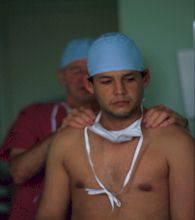 Social and Cultural Factors See Increased Infection Rate Study Examines 900 Mexicans, Cubans & Puerto Ricans |
|
Compiled By GayToday
The report, entitled Social Discrimination and Health: The Case of Latino Gay Men and HIV Risk, directly connects social discrimination to an increased risk of HIV infection in the gay Latino population. "Many people have dedicated their lives to reducing the incidence of HIV and AIDS in people of color communities for decades, and their work and their recommendations for combating this disease have been ignored for too long," said NGLTF Executive Director Lorri L. Jean. "We hope that policymakers and funders of AIDS services will use this report as a catalyst for action."
This groundbreaking study documents the correlation between three forms of social oppression - homophobia, racism and poverty - with the risk-taking behavior associated with HIV transmission. Current HIV prevention strategies do not account for the impact of social discrimination on self-esteem and one's sense of individual agency. This impact can render "one size fits all" HIV prevention strategies ineffective among populations experiencing multiple levels of social oppression. During the past decade, transmission of HIV has continued at an alarming rate, especially among ethnic minorities within the gay male population. "In the U.S., Blacks and Latinos are now eight and three times more likely, respectively, than non-Latino Whites to be diagnosed with AIDS. In the year 1999-2000, the Centers for Disease Control (CDC) reported that 69 percent of new HIV infections were among Black and Latino individuals, most of them men who have sex with men. This trend attests to the compounding negative effects of multiple sources of discrimination," said Diaz. NGLTF held a press conference in Los Angeles to announce the findings of the study and to educate and motivate change within the HIV/AIDS activist, GLBT, and Latino communities. "If we are to be effective in our fight against AIDS and any other public health tragedies that feed on human powerlessness, HIV prevention workers and advocates must be agents of social and cultural change," Diaz said. Social Discrimination and Health documents a strong correlation between high-risk sexual behaviors and experiences of social discrimination. People engaging in high-risk sexual behaviors, such as anal sex without a condom, were more likely than those who reported low-risk sexual practices to have experienced homophobia, racism, and insufficient economic resources, both in childhood and adulthood. However, the presence of an openly gay adult role model during childhood, and the acceptance of one's homosexuality by one's family, correlated with lower incidence of high-risk behaviors. These resiliency factors have significant policy implications, not only for HIV transmission, but also for the Boy Scouts controversy and for safe schools initiatives to combat homophobia. Among the report's findings: Relation of Oppression to Sexual Risk: Men were placed in two groups, according to their level of risk for HIV infection. Men in the "high-risk" group reported significantly more experiences of homophobia, racism and poverty. Men in the low-risk group had experienced homophobia, racism and poverty, but researchers found that presence of a positive gay role model while growing up and family acceptance correlated with the decreased risk for HIV transmission.
Social Discrimination and Health: The Case of Latino Gay Men and HIV Risk is a collaborative project authored by Rafael M. Diaz and George Ayala and published by the National Gay and Lesbian Task Force. To purchase a copy of the publication: www.ngltf.org/library |


 Washington, D.C.--Current HIV prevention methods do not adequately address
social and cultural factors that can contribute to increased risk for HIV
infection among Latino gay men, according to a report released Thursday by
the Policy Institute of the National Gay and Lesbian Task Force.
Washington, D.C.--Current HIV prevention methods do not adequately address
social and cultural factors that can contribute to increased risk for HIV
infection among Latino gay men, according to a report released Thursday by
the Policy Institute of the National Gay and Lesbian Task Force.